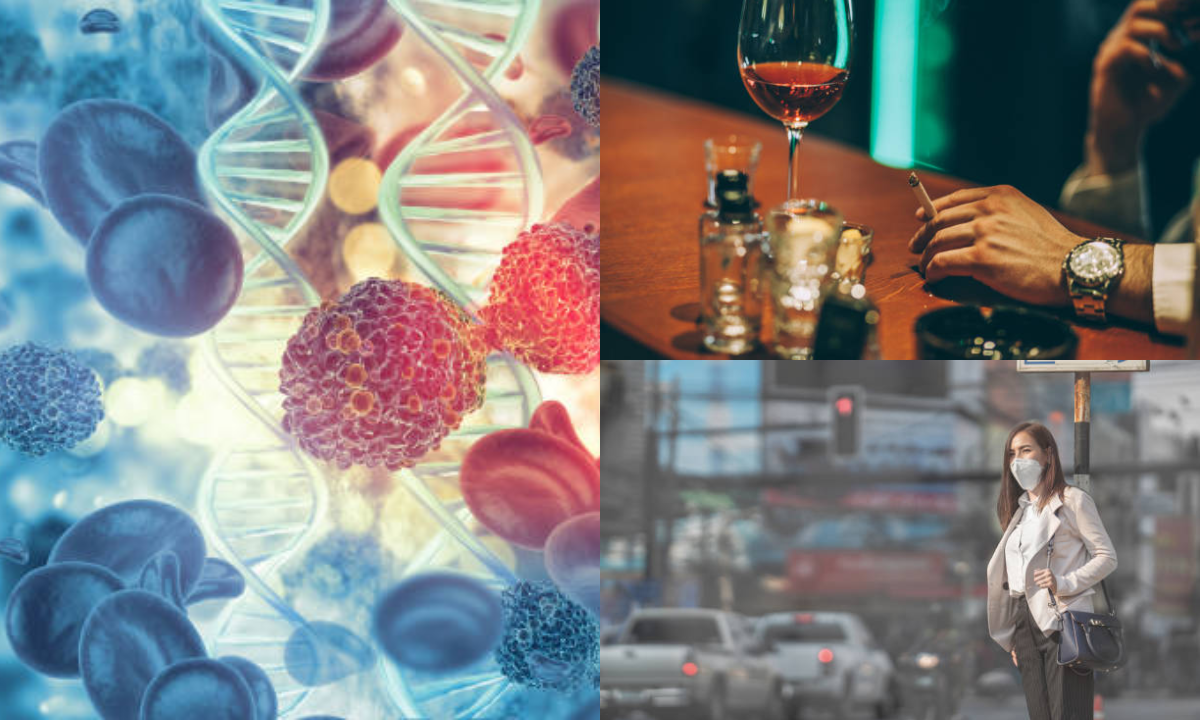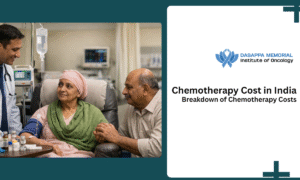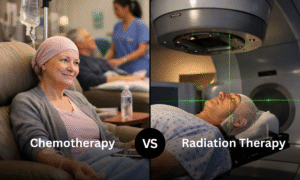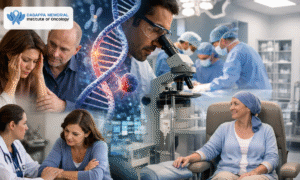When we talk about the causes of cancer, it’s important to remember that cancer is not the result of one single factor. It develops through a combination of genetics, lifestyle choices, and environmental exposures. Each plays a role in how cells grow, divide, and sometimes turn abnormal.
For patients and families, knowing what might trigger cancer is not just about awareness; it’s about prevention and making informed choices. The good news is that while we can’t control every factor, we can reduce many risks with the right steps.
In this blog, we will explore the genetic, lifestyle, and environmental factors that contribute to cancer, examine specific cancers such as those affecting the blood, lungs, and liver, and understand why early cancer detection is crucial for achieving better outcomes. We will also share practical tips and examples, as well as answer common questions that patients often ask.
Why Understanding Cancer Causes Matters
Knowing what causes cancer helps in three ways:
- It empowers patients and families to take preventive actions.
- It guides doctors in recommending lifestyle and screening strategies.
- It removes fear by replacing myths with facts.
Think of it like maintaining your car; you cannot prevent every issue, but by understanding the risks and acting early, you can keep it running smoothly for years. The same applies to your health.
Genetics: The Inherited Causes of Cancer
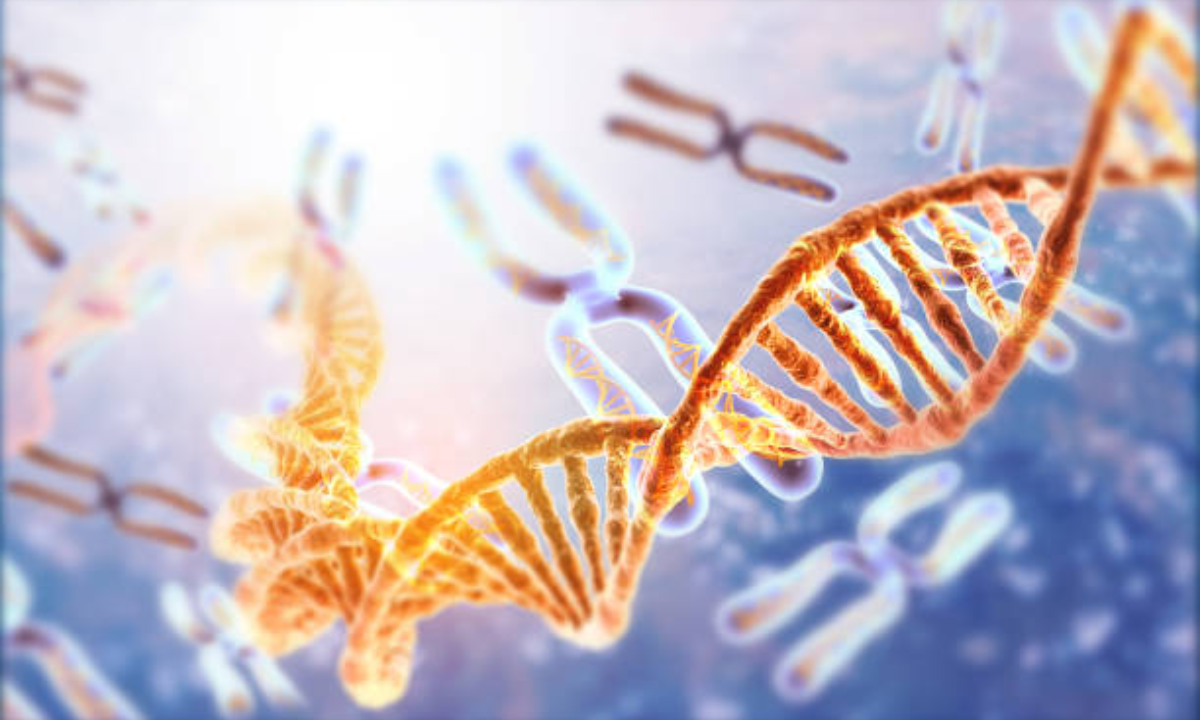
Sometimes, cancer is passed down through families. This happens when certain genetic mutations are inherited from parents.
Key points about genetic causes:
- They account for about 5–10% of all cancers.
- Common inherited mutations include BRCA1 and BRCA2 (linked to breast and ovarian cancers).
- Having a family history does not mean cancer is certain, but it does increase risk.
Example: If a mother had breast cancer before the age of 50, her daughter may be advised to begin mammograms much earlier than usual.
Tip: If multiple family members have had the same type of cancer, genetic counselling may help identify risks early.
Lifestyle Factors: Choices That Influence Cancer Risk

Lifestyle plays a major role in cancer development. Habits we build over the years can either increase or decrease our chances.
Some lifestyle-related causes of cancer include:
- Tobacco use – Linked to lung, mouth, throat, and bladder cancers.
- Unhealthy diet – High-fat, processed foods increase risk; fruits and vegetables lower risk.
- Lack of physical activity – Sedentary lifestyle contributes to obesity, which is tied to many cancers.
- Alcohol consumption – Increases the chances of liver, breast, and esophageal cancers.
Example: A person who smokes heavily and drinks regularly has a significantly higher risk of developing lung and liver cancers compared to someone who avoids these habits.
Tip: Small daily changes, like quitting smoking, eating more fiber-rich foods, and exercising for 30 minutes, reduce lifetime cancer risk.
Environmental Cancer Risks

Our surroundings can also contribute to cancer. Prolonged exposure to harmful substances can damage DNA and trigger abnormal cell growth.
Common environmental cancer risks:
- Air pollution – Fine particles are linked to lung cancer.
- Radiation – UV rays from the sun cause skin cancer; radon gas exposure increases lung cancer risk.
- Chemicals at work – Asbestos, benzene, and pesticides are linked to blood and lung cancers.
- Contaminated water or food – Certain toxins and heavy metals may raise risks of liver cancer.
Tip: Protect yourself by wearing masks in polluted areas, using sunscreen, and following safety rules at workplaces where chemicals are present.
Specific Types of Cancer and Their Causes
Causes of Cancer of the Blood (Leukemia and Lymphoma)
- Exposure to radiation or chemicals like benzene.
- Genetic mutations in blood-forming cells.
- A weakened immune system causes blood cancer.
Example: Workers exposed to industrial chemicals over many years may have higher leukemia risks.
Causes of Cancer of the Lungs
- Cigarette smoking is the leading cause (responsible for about 85% of lung cancers).
- Exposure to asbestos, radon, and polluted air.
- Family history of lung cancer.
Tip: Quitting smoking at any age lowers lung cancer risk dramatically.
Causes of Cancer of the Liver
- Chronic infections like Hepatitis B and C.
- Long-term alcohol use.
- Non-alcoholic fatty liver disease (linked to obesity and diabetes).
- Aflatoxin (a toxin from mouldy grains or peanuts).
Example: A person with chronic hepatitis infection who also drinks heavily is at very high risk of developing liver cancer.
The Role of Early Cancer Detection
Even though the causes of cancer vary, early cancer detection saves lives. Many cancers, when caught at stage one or two, have high survival rates.
Methods for early detection include:
- Screening tests like mammograms, Pap smears, and colonoscopies.
- Blood tests for cancer markers.
- Regular check-ups, especially with a family history.
Tip: Do not wait for symptoms. Many cancers remain silent in the early stages. Preventive screenings are crucial.
Causes of Cancer at a Glance
| Factor | Examples | Linked Cancers | Preventive Action |
| Genetics | BRCA1/2, family history | Breast, ovarian, colon | Genetic counseling, regular screening |
| Lifestyle | Smoking, alcohol, poor diet | Lung, liver, stomach | Quit smoking, eat a healthy diet, and exercise |
| Environmental | Air pollution, asbestos | Lung, blood, skin | Safety gear, sunscreen, clean air |
| Infections | Hepatitis B/C, HPV | Liver, cervical | Vaccines, safe practices |
FAQs on Causes of Cancer
Q1. Can cancer always be prevented?
No, not always. Some genetic and environmental factors are beyond control. But lifestyle changes and regular screenings reduce risks significantly.
Q2. Are the causes of blood cancer different from solid tumors?
Yes. Blood cancers like leukaemia often result from genetic mutations and chemical exposures, while solid tumors (like lung cancer) often come from lifestyle and environmental risks.
Q3. How do environmental cancer risks affect children?
Children are more vulnerable because their bodies are still developing. Exposure to pollutants, second-hand smoke, or contaminated water may increase future cancer risk.
Q4. What role does diet play in preventing cancer?
A diet rich in fruits, vegetables, and whole grains lowers cancer risk. Processed foods, red meats, and sugary drinks increase risk.
Q5. Why is early cancer detection important even if I feel healthy?
Many cancers do not show symptoms until advanced stages. Early detection gives doctors a better chance of successfully treating.
Final Thoughts
Understanding the causes of cancer gives patients and families the power to make healthier choices. From genetics and lifestyle to environmental cancer risks, each factor adds to the bigger picture of cancer prevention and care.
At Dasappa Memorial Institute of Oncology, we have seen firsthand how awareness and timely action save lives. Recognised as the best cancer hospital in Bangalore, our focus remains on guiding patients with clarity, compassion, and the latest medical expertise.
By staying informed, avoiding preventable risks, and prioritizing early cancer detection, we can all take meaningful steps in the fight against cancer.

